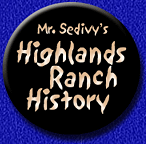|
Highlands Ranch High School - Mr. Sedivy
Highlands Ranch, Colorado

- Colorado History -
The Cheyenne Social Club
The Scalp Dance and
Other Traditional Cheyenne Dances
The scalp was a good thing to carry back to the village
and dance over; in addition, it was used to trim and fringe war clothing
and to tie to the horses bridle in going to war. Usually the scalps
taken were only a little larger than a silver dollar, but like any
any other piece of flesh they stretched greatly, and the young men
were instructed how to do this.
The Scalp Dance
Anyone familiar with Indians and Indian ways will understand that
that the various dances they practice are not merely haphazard jumping
up and down and chance singing. The ceremony of the dances is perfectly
well defined, and the songs are well known and unvarying as if they
had been printed. There was a ceremony established for the scalp dance.
While it was a victory dance it was also very social in character.

Lieutenant Abert's depiction of a Cheyenne scalp dance
at Bent's Fort in 1840.
Hee Man Eh
These old-time scalp dances were directed by a little group of men
called Hee man eh, "halfmen - halfwomen." They were men,
but had taken up the way of women; even there voices sounded between
that of a man and a woman. They often served as second wives in a
married man's household.
There were only five of these in the tribe, and were
all members of the same kindred- the Bare Legs family. They were very
popular and favorites of the young Cheyennes because they were known
matchmakers. They were fine love talkers. When a young man wanted
to send gifts to a girl, horses to her family, one of these halfmen-halfwomen
were sent to the girls relatives to do the talking in making the marriage.
These men had both men's names and woman's names. It could be said
these were the first transvestites.
When a war party was preparing to start out, one of
these persons was asked to accompany it. They were good company and
fine talkers. During the fighting they would care for the wounded,
in which they were very skillful, for they were doctors or medicine
men. If one of the party had been killed, the scalps were thrown away
and there was no scalp dance upon their return. If a person had counted
coup and had been killed, the scalp dance went on just as if no one
had been killed.
The scalp dance was no wild frenzied affair, as most
people might imagine, rather it was a sociable courtship dance, made
up of several parts. It took place around a huge bonfire prepared
by the halfmen-halfwomen. The singers for the dance were middle-aged
men, all married. The young men lined up north of the fire, and the
young women lined up across from them.
Other Cheyenne Dances
The first dance was a Sweetheart's Dance, followed by a Matchmaking
Dance, a Round Dance, the Slippery Dance and the Galloping Buffalo
Bull Dance. Then everyone stood up and went into the Round Dance,
and the drummers and the singers, mating couples and old people, were
all united in one, closed happy, collective unity. They all sang together
as they danced while morning dawned.
Changes in Cheyenne Culture
In 1830, the Cheyennes were sufficiently equipped with horses, and
they left their villages for the nomadic way of life. The horse and
mobility had changed their culture drastically during the thirties.
By 1859, the whites were coming to Colorado in droves
- the Pikes Peak Gold Rush was on and with it the Cheyennes culture
would once again be transformed.

An 1895 gold rusher dies on the plains. Pikes Peak
or Bust was both his slogan and epitaph. No one counted how many prospective
miners died en route to Pikes Peak, but the casualties were appalling.
The stories they left behind have furnished us concrete
examples of their way of life and thought. The past, as always, has
left its imprint on our minds.
The Cheyenne Social Club:
| A Cheyenne War Story: Wolf Road, the Runner
|
| Cheyenne Traditions and Beliefs, Sacred
Stories |
| Horses, Warriors, War Pipe, Sweatlodge
Ceremony |
| Cheyenne War Parties and Battle Tactics
|
| The Scalp Dance and Other Cheyenne Dances
|
Bibliography is available by email
request.
Back to the top of page
- Colorado History In Depth
-
Lecture Notes, Reading, and Information:
| The Cheyenne Migration
to Colorado |
| The Gratlan Affair, Massacre, Fort Laramie
Treaty |
Fort Union
| The Sante Fe Trail and Fort Union |
| Sumner - Ninth Military Department / The
First Fort Union |
| Early Arrivals to Fort Union, Daily Life
at Fort Union |
| Captain Grover - The New Fort Union, the
Confederate Threat |
| Fort Union Arsenal, William Shoemaker,
End of Fort Union |
Americans from the East
| Thomas Jefferson, the Louisiana Purchase
|
| The Expedition of Zebulon Pike |
| Pikes Peak or Bust / Colorado Gold Rush
|
Colorado's Role in the US Civil
War
| The Civil War, Fort Wise / Fort Lyon
|
| Mace's Hole, Colonel Canby, F.C.V.R.
| Fort Weld |
| The Pet Lambs, John Chivington |
| General Henry Sibly, Battle of Valverde,
Fort Union |
Cripple Creek District Labor Strikes
| The Western Federation of Miners / State
Militia |
| The 1893 - 1894 Strike | The
Strike of 1903 - 1904 |
| The Mine Owners Association |
| Crimes and Military Rule in the Cripple
Creek District |
| Marshall Law in Cripple Creek District
/ End of the Strike |
Early Cripple Creek District
| Photos, Fire, and Life in Cripple Creek
|
| Other Colorful Towns in the Cripple Creek
District:
Gillett - Colorado's Only Bullfight, Victor, Independence |
| A Guide to the Miners' Gritty Lingo
|
More Colorado History
Information
| Bent's Fort Photos, Personalities, Plans,
and More |
| What Was Easter Like at Bent's Fort?
|
| Colorado Trivia,
Miscellaneous Old Photos,
Western Personalities, Forts, and More |
| Lullabies for Jittery Cows - Cowboy Ballads
|
| Heraldry of the Branding Iron |
| Project
Aims to Clear Infamous Cannibal, Alferd Packer |
| Lead Gives Alferd
Packer's Story More Weight |
| Legendary
Colorado Love Stories: Baby Doe Tabor & More
|
| Colorado Pioneer Women: Elizabeth Byers
|
| Early Denver Jokes / The History of April
Fools' Day |
Back to the top of page
|



![]() 9375 South Cresthill Lane
9375 South Cresthill Lane ![]() Highlands Ranch, Colorado 80126
Highlands Ranch, Colorado 80126 ![]() 303-471-7000
303-471-7000


